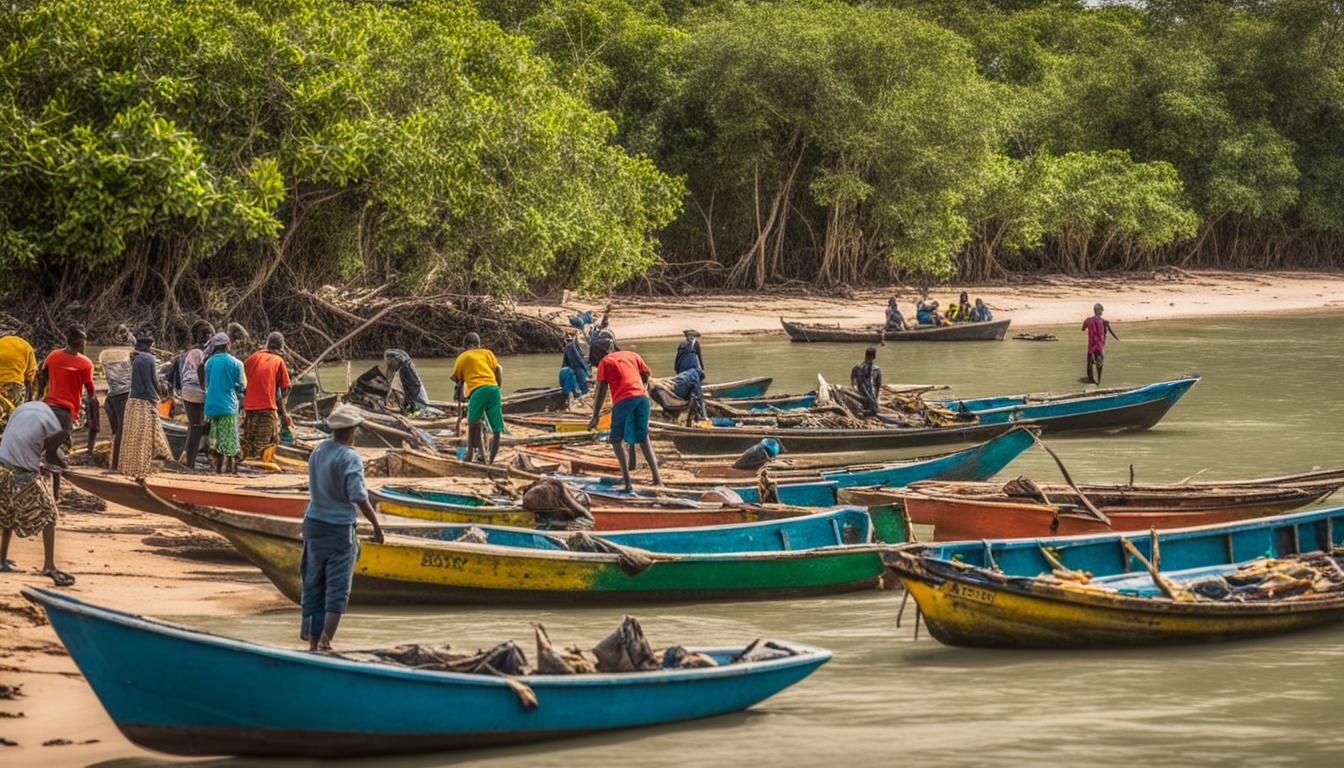Over 50% of Guinea-Bissau’s population lives below the poverty line, making the country one of the poorest in the world. Yet, the nation’s economy is heavily dependent on its natural resources, particularly the sale of cashew nuts and fisheries licenses, which account for a staggering 87% of its export earnings. This stark reality underscores the critical importance of effective coastal resource management in Guinea-Bissau, where the majority of the population and economic activity are concentrated in the coastal zone, leading to increasing pressure on the country’s coastal and marine resources.
Key Takeaways
- Guinea-Bissau’s economy is heavily reliant on natural resource exports, particularly cashews and fisheries licenses, which account for 87% of its export earnings.
- Over 50% of the population lives below the poverty line, underscoring the need for sustainable management of coastal and marine resources.
- The coastal zone houses the majority of the population and economic activity, leading to increasing pressure on these vital resources.
- Poverty is a root cause of biodiversity loss, as natural resources form the foundation of livelihood strategies for most of the population.
- Effective coastal resource management is crucial for Guinea-Bissau’s economic and environmental sustainability.
Guinea-Bissau: Coastal Resource Management Bissau Guinea-Bissau
Guinea-Bissau, a small West African nation, is making strides in coastal resource management to preserve its rich marine ecosystem and biodiversity. From April 23 to 26, 2024, the capital city of Bissau will host the 11th edition of the Coastal and Marine Regional Forum, organized by the Regional Partnership for the Conservation of the Coastal and Marine Zone in West Africa (PRCM). This international event will bring together experts, policymakers, representatives from NGOs, and donors to discuss the challenges and opportunities related to coastal ecosystem conservation.
The opening ceremony of the forum will be presided over by the President of the Republic of Guinea-Bissau, Umaro Embalo Sissoco, demonstrating the high-level commitment of the state to marine ecosystem preservation and sustainable development. This gathering will provide a platform for stakeholders to collaborate and explore innovative solutions to safeguard Guinea-Bissau’s coastal and marine resources, which are vital for the country’s biodiversity conservation and the livelihoods of its coastal communities.
Overview of Guinea-Bissau’s Coastal and Marine Environment
Guinea-Bissau’s coastal and marine environment is a diverse and intricate ecosystem, characterized by extensive mangrove forests, rich biodiversity, and important fishing activities. These coastal resources play a vital role in the country’s economy and the livelihoods of local communities.
Mangrove Ecosystems and Biodiversity
The coastal region of Guinea-Bissau is home to one of the largest mangrove ecosystems in West Africa. These lush, brackish-water forests provide critical habitat for a wide range of species, including migratory birds, marine turtles, and numerous fish and crustacean species. The mangroves also play a crucial role in maintaining the coastal environment, protecting against erosion and acting as natural barriers against storms and flooding.
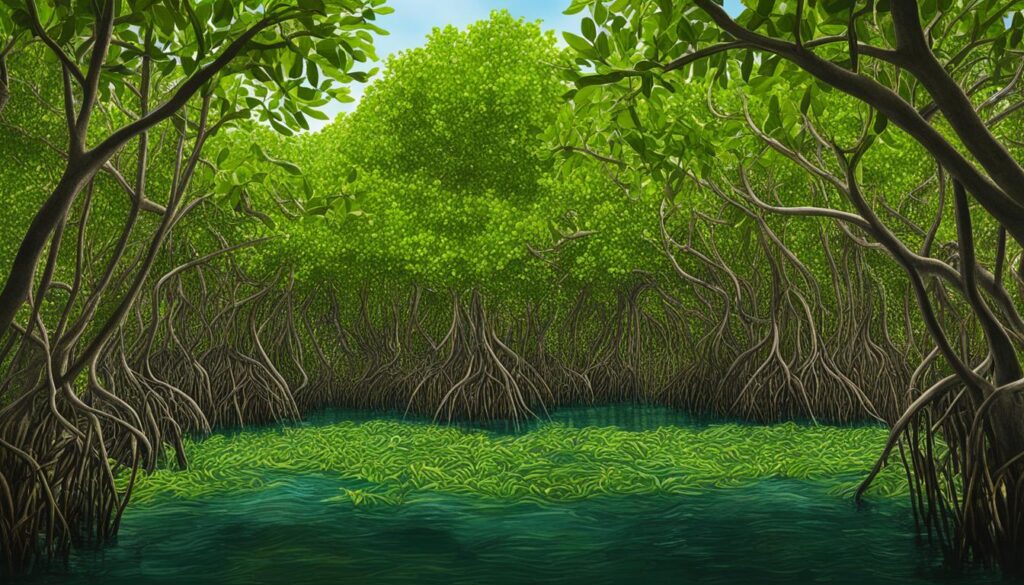
Artisanal and Industrial Fishing
The coastal waters of Guinea-Bissau support both thriving artisanal and industrial fishing industries. Artisanal fishermen, often using traditional methods and small boats, rely on the coastal environment for their livelihoods, targeting a variety of fish and shellfish species. The industrial fishing sector, on the other hand, is an important contributor to the national economy, with foreign vessels operating in the country’s exclusive economic zone. Ensuring the sustainable management of these fishing activities is crucial for the long-term viability of the coastal environment.
Threats to Coastal and Marine Resources
Guinea-Bissau’s coastal and marine resources face a range of pressing threats. Poverty and unsustainable practices, such as itinerant agriculture, rice production, artisanal fishing, and the extraction of fuelwood from forests and mangroves, pose serious challenges to the long-term health of these vital ecosystems.
Poverty and Unsustainable Practices
Many coastal communities in Guinea-Bissau struggle with poverty, leading them to engage in unsustainable resource extraction and land-use practices. Subsistence farming, fishing, and the collection of fuelwood from mangroves and other coastal forests often exceed the capacity of these sensitive environments to regenerate. This depletion of natural resources further exacerbates the cycle of poverty, creating a pressing need for sustainable development strategies that balance economic and environmental priorities.
Offshore Oil and Gas Exploration
The potential for offshore oil and gas exploration in Guinea-Bissau’s coastal zone could also have significant environmental and social impacts if not properly managed. Unregulated exploration and extraction activities can damage fragile marine ecosystems, disrupt local livelihoods, and lead to conflicts over land and resource use. Careful planning, robust environmental impact assessments, and strong regulatory frameworks are essential to ensuring that any offshore oil and gas development is carried out in a sustainable and equitable manner.
National Policies and Institutional Framework
The Government of Guinea-Bissau (GOGB) recognizes the importance of maintaining the quality of the environment and natural resource base. The national development program for 2001-2010 prioritizes sustainable economic growth based on the rational exploitation of agricultural, forestry, and fishery resources, as well as the elaboration of a national policy and plan for environmental management, the management of parks and protected areas, and the implementation of a biodiversity management program in the coastal areas.
The GOGB has established an institutional framework to address environmental policies and natural resource management. This includes the Secretariat of State for the Environment and Tourism, which is responsible for coordinating and implementing environmental policies and programs. Additionally, the Institute of Biodiversity and Protected Areas (IBAP) plays a key role in managing the country’s network of national parks and protected areas, which cover a significant portion of the coastal and marine ecosystems.
The national environmental policies in Guinea-Bissau aim to promote sustainable development, protect biodiversity, and ensure the efficient management of natural resources. These policies are further reinforced by the country’s commitment to international environmental agreements, such as the Ramsar Convention on Wetlands and the Convention on Biological Diversity.
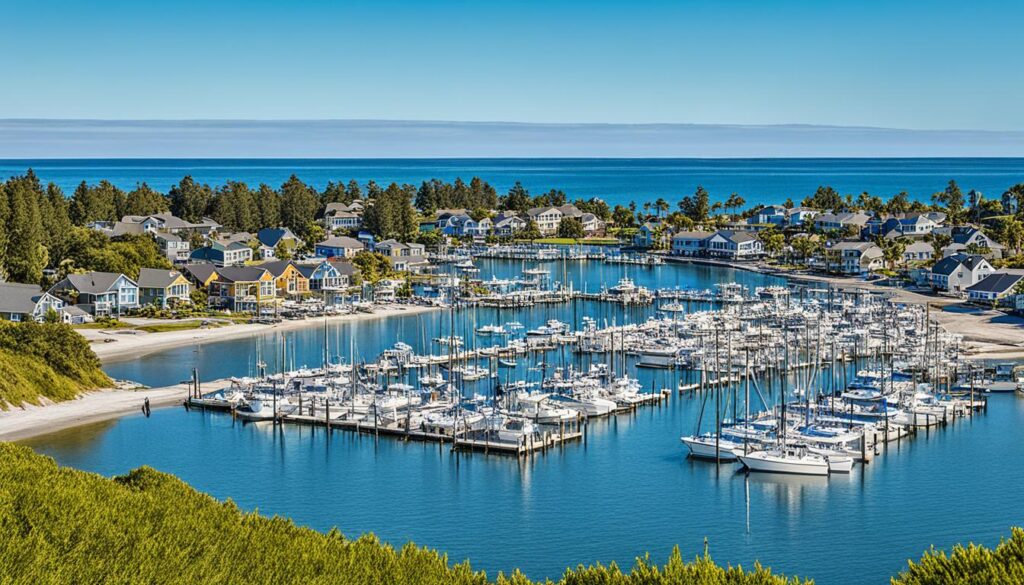
Despite these efforts, the implementation and enforcement of environmental policies and regulations in Guinea-Bissau remain a significant challenge. The country faces limited financial and human resources, as well as institutional weaknesses that hinder the effective management of its coastal and marine resources. Addressing these challenges will be crucial to ensuring the long-term sustainability of Guinea-Bissau’s environmental assets.
Challenges in Fisheries Management and Monitoring
Guinea-Bissau faces significant challenges in managing and monitoring its fisheries resources. One of the primary issues is the prevalence of illegal, unreported, and unregulated (IUU) fishing by both foreign and domestic vessels. This type of fishing undermines the country’s efforts to sustainably manage its coastal and marine ecosystems.
Illegal, Unreported, and Unregulated Fishing
IUU fishing is a major threat to the long-term viability of Guinea-Bissau’s fisheries. Unauthorized vessels often operate in the country’s waters, exploiting marine resources without adhering to regulations or reporting their catches. This not only depletes fish stocks but also deprives the government of vital revenue and compromises the livelihoods of local fishing communities.
Encroachment on Marine Protected Areas
Another significant challenge is the encroachment of industrial fishing fleets on the country’s marine protected areas (MPAs). These designated conservation zones are critical for preserving the biodiversity and ecological integrity of Guinea-Bissau’s coastal habitats. However, some industrial fishing vessels have been known to illegally operate within these protected areas, further jeopardizing the fragile marine ecosystems.
Addressing these challenges in fisheries management and monitoring is crucial for ensuring the long-term sustainability of Guinea-Bissau’s illegal fishing and marine protected areas. Effective enforcement, enhanced surveillance, and collaborative efforts with local communities and international partners will be key to overcoming these obstacles.
Establishing a Monitoring and Surveillance System
To address the challenges in fisheries management and monitoring, the Coastal and Biodiversity Management Project in Guinea-Bissau aims to support the establishment of a robust fisheries monitoring and surveillance system. This initiative will involve testing and implementing a comprehensive fisheries control system, as well as investing in essential equipment, infrastructure, and operating costs for the institutions responsible for managing the country’s valuable fisheries resources.
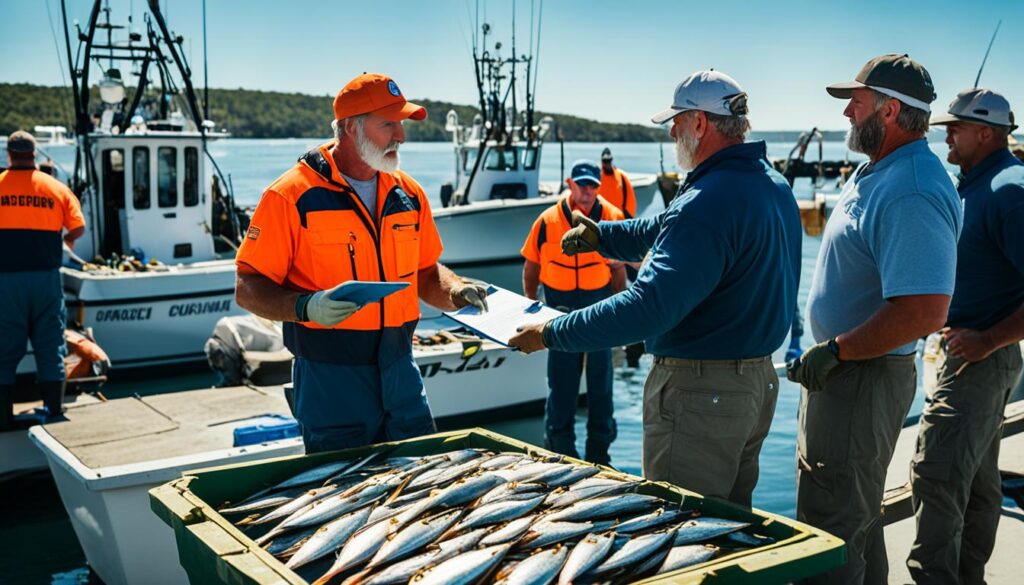
By strengthening the national capacity for fisheries monitoring and surveillance, the project seeks to enhance the management of Guinea-Bissau’s coastal and marine resources. This includes tackling issues such as illegal, unreported, and unregulated (IUU) fishing, which has long posed a significant threat to the sustainability of the country’s fisheries. The project will also work to address the encroachment of marine protected areas, ensuring that these vital ecosystems are effectively safeguarded.
Underpinning these efforts is a focus on improving the overall management capacity of the relevant institutions and agencies responsible for overseeing the fisheries sector. Through targeted training, capacity-building, and the provision of necessary resources, the project aims to empower these stakeholders to effectively monitor, control, and regulate the country’s marine resources, ultimately contributing to the long-term sustainability of Guinea-Bissau’s coastal and fisheries management.
Participatory Approach and Stakeholder Engagement
The Coastal and Biodiversity Management Project in Guinea-Bissau recognizes the critical importance of adopting a participatory approach that engages key stakeholders, including local communities and civil society organizations. This inclusive process will build on the findings of a comprehensive economic sector analysis and facilitate a consensus-building exercise with government representatives, the fishing industry, donors, and regional fisheries organizations. The goal is to ensure the sustainable management of the country’s invaluable coastal and marine resources through stakeholder engagement and participatory management.
Involving Local Communities and Civil Society
A central tenet of the project’s strategy is to involve local communities and civil society in the decision-making and implementation processes. By fostering active participation from these key stakeholders, the project aims to enhance the long-term sustainability of coastal resource management initiatives. This collaborative approach will empower local communities to play a more active role in protecting and preserving their marine environments, while also strengthening the capacity of civil society organizations to advocate for responsible and equitable resource governance.
Through this participatory management model, the project hopes to build a broad-based coalition of stakeholders committed to the sustainable development of Guinea-Bissau’s coastal and marine ecosystems. By integrating the perspectives and knowledge of local communities and civil society, the project can develop more holistic and effective strategies for addressing the complex challenges facing these vital natural resources.
Sustainable Coastal Tourism and Ecotourism
Guinea-Bissau’s stunning coastline and diverse marine ecosystems offer immense potential for sustainable tourism and ecotourism development. By embracing these sustainable approaches, the country can generate economic benefits while also promoting the conservation of its precious natural resources.
Sustainable coastal tourism in Guinea-Bissau can involve the creation of eco-lodges, guided tours, and other tourism activities that showcase the unique biodiversity and cultural heritage of the coastal regions. These initiatives not only provide economic opportunities for local communities but also raise awareness about the importance of environmental conservation.
Ecotourism, in particular, presents a unique opportunity to strike a balance between economic development and environmental protection. By offering immersive experiences that allow visitors to explore the country’s mangrove ecosystems, pristine beaches, and vibrant marine life, ecotourism can generate sustainable livelihoods for local communities while instilling a sense of stewardship for the coastal and marine environment.
The development of sustainable coastal tourism and ecotourism in Guinea-Bissau requires a collaborative effort between the government, private sector, and local communities. By fostering public-private partnerships and involving stakeholders in the planning and management processes, the country can ensure that these initiatives truly benefit the local population and contribute to the long-term conservation of its coastal and marine resources.
Climate Change Adaptation and Resilience
As Guinea-Bissau’s coastal and marine resources face increasing threats from climate change, it is essential to develop strategies for adaptation and building resilience. This may involve measures such as mangrove restoration, the implementation of early warning systems, and the integration of climate change considerations into national environmental and resource management policies.
Mangrove ecosystems, which play a crucial role in coastal protection, are particularly vulnerable to the impacts of climate change, including sea-level rise and extreme weather events. Restoring and conserving these vital habitats can enhance coastal resilience and provide a natural defense against the effects of climate change.
Additionally, early warning systems can help communities prepare for and respond to climate-related disasters, such as floods and storm surges. By integrating climate change adaptation into national policies and plans, Guinea-Bissau can ensure that its environmental management practices are resilient and sustainable in the face of a changing climate.
Addressing climate change adaptation and resilience is essential for safeguarding Guinea-Bissau’s valuable coastal and marine resources, which are the foundation for the country’s economy and the livelihoods of its people. By taking proactive measures, Guinea-Bissau can strengthen its ability to withstand and adapt to the impacts of climate change, ensuring a more sustainable future for its coastal communities.
Regional Cooperation and International Partnerships
Effective management of Guinea-Bissau’s coastal and marine resources will require a collaborative approach. This involves regional cooperation with neighboring countries, as well as developing international partnerships with organizations and donors. By working together, Guinea-Bissau can access the technical and financial resources needed to implement conservation and sustainable development initiatives along its coastline.
Regional cooperation is crucial for addressing shared environmental challenges, such as illegal, unreported, and unregulated (IUU) fishing. Through joint monitoring and enforcement efforts, neighboring countries can combat the depletion of shared fish stocks and protect marine biodiversity. Additionally, regional collaboration can facilitate the exchange of best practices and the development of harmonized policies for coastal management.
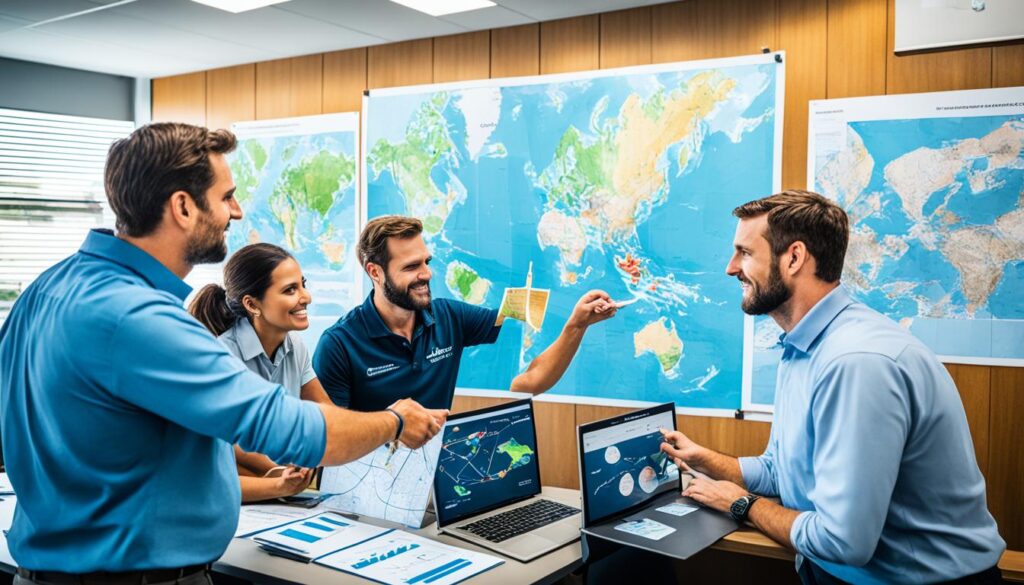
International partnerships, on the other hand, can provide Guinea-Bissau with access to expertise, technology, and funding. By engaging with global organizations and donor agencies, the country can secure support for initiatives that promote sustainable coastal management and biodiversity conservation. These partnerships can also help to strengthen institutional capacities and foster the implementation of effective monitoring and surveillance systems.
Ultimately, a combination of regional cooperation and international partnerships will be essential for Guinea-Bissau to effectively manage its coastal and marine resources. This integrated approach will enable the country to address complex environmental challenges, safeguard its unique biodiversity, and ensure the long-term sustainability of its coastal communities.
Conclusion
Guinea-Bissau’s coastal and marine resources are the backbone of the nation’s economic development and the livelihoods of its people. However, these precious resources face significant threats from poverty, unsustainable practices, and emerging industries like offshore oil and gas exploration. To address these challenges, a comprehensive approach is required, one that combines robust national policies, strengthened institutional capacity, meaningful stakeholder engagement, and regional cooperation.
By prioritizing the sustainable management of its coastal and marine ecosystems, Guinea-Bissau can ensure the long-term viability of these vital resources and the communities that depend on them. Through strategic investments in conservation, resource monitoring, and sustainable development initiatives, the country can strike a balance between economic progress and environmental protection.
As Guinea-Bissau continues to navigate the complexities of coastal resource management, it must remain steadfast in its commitment to sustainability, community engagement, and international partnerships. Only then can the nation truly harness the full potential of its coastal and marine assets, driving economic growth while preserving the delicate ecological balance that sustains its people and its future.
Source Links
- World Bank Document – https://documents1.worldbank.org/curated/en/580051468773971068/pdf/30523.pdf
- Guinea Bissau – Coastal and Biodiversity Management Project – https://documents.worldbank.org/en/publication/documents-reports/documentdetail/580051468773971068/Guinea-Bissau-Coastal-and-Biodiversity-Management-Project
- A Key Meeting for Marine Resource Conservation in Africa – MOSFA/OMPDA – https://www.mosfa-ompda.org/en/2024/04/11th-coastal-and-marine-regional-forum-in-guinea-bissau-a-key-meeting-for-marine-resource-conservation-in-africa/
